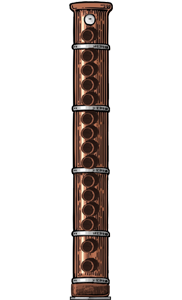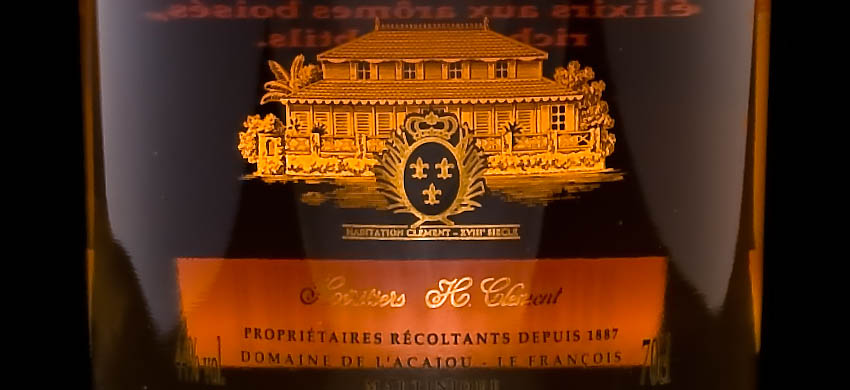Rhum Clément originates from the isle of Martinique which is situated in the French West Indies, between the islands of Dominica and St. Lucia and north of Trinidad & Tobago. The 1,128km² island is an overseas department of France thus a part of the European Union which also means the currency used on Martinique is the Euro.
The official language is French but most of the inhabitants speak Créole Martiniquais. Martinique's most important agricultural products are: pineapples, avocados, bananas, flowers, vegetables and of course, sugarcane. Martinique's rich soil or 'terroir' is optimal for sugar cane cultivation and about half of the grown sugar cane is used to make Rhum Agricole such as Clément Rhum Vieux that I am reviewing today.
Rhum Clément is one of the bottlers of A.O.C. (Appellation d’Origine Contrôlée: term of controlled origin)Martinique Rhum Agricole, it's distiller being Simon and the other A.O.C. producers, bottlers and blenders being: Depaz, Dillon, J.M., La Favorite, La Mauny, Neisson, St. James, G. & P. Dormoy, G. Hardy, J. Bally, Rhumeries Duquesne, Saint Etienne and Trois Rivières.
Rhum Clément’s history is rich and colourful and begins at the height of the great sugar crisis in Martinique, when the European markets had to source cheaper sugar from Central and South America due to the higher sugar price in Martinique. Because of this the sugar production on the island stopped, making molasses, from which rum was distilled, unavailable resulting in high rate of unemployment and economic despair.
In 1887 a physician named Homère Clément, born in 1852 in Trinité and elected Mayor of Martinique in 1878, purchased Domain de l'Acou in Le Francois, a 300 acre sugar plantation considered one of the best sugar plantations on the island now known as Habitation Clément, and converted it into a Rhum Agricole plantation and distillery.
During the sugar crisis his insight to distil rhum from the fermented juice of pressed sugar cane, gave new hope to the people of Martinique as the former planters got their jobs back and the economy rose. This was indeed the first time rum was being made this way which lead into him being called as "The Father of Rhum Agricole."
In 1923 Homère Clément passed away and his son, Charles Clément, took over his fathers business and introduced Rhum Clément outside Martinique and the Caribbean. Through his efforts France became the first great market for Rhum Agricole and with the help of his sons Rhum Clément expanded its market throughout the Caribbean, Europe, South- and North America. In 1987 Rhum Clément was sold to the Hayot family in whose control Rhum Clément and Habitation Clément remains today and in 1989 the rhum production moved to the Simon distillery on Martinique.
The harvest for sugar cane begins at the peak of its maturity, the only time when juice can be extracted from it, at the end of February lasting till the beginning of May. To get the highest concentration of sucrose the cane is cut as low to the ground as possible and then delivered to the distillery which is within a views distance from the cane fields.
The sugar cane is crushed to get their natural juice or 'vesou' which is then fermented for anywhere between 24 and 72 hours, the resulting product being a slightly alcoholic (between 5 and 9 ABV) sugar cane wine or Vin de Canne. Longer fermentation time will make the concentration of the aroma higher.
The sugar wine is distilled in a small single-column copper still, at Distillerie Simon, which produces heavier lower strength spirit whereas the tall stills produce higher strength and lighter spirits. After distillation the cane spirit is transported to Habitation Clément and placed in stainless steel tanks for 9 months to allow it to mellow and have any unpleasant esters to be removed through a device built in the tank which uses a stream of filtered air to create tiny bubbles that pass through the rhum cleansing it.
After spending 9 months in the tanks the rhum is ready for ageing or bottling. Limousin and American oak barrels are used to age Clément rhum - Clément Rhum Vieux is first aged for one year in 200 litre Limousin oak barrels and then for another three years in Kentucky bourbon barrels, both barrels playing their part in giving the desired characteristics to the rhum.
Rapid loss of rhum through barrels is the result of the hot climate of Martinique where the average temperature is 17.3 degrees Celsius. Each year Rhum Clément loses around 8-10% of rhum from their ageing barrels and to keep up with the loss the barrels are continuously topped off with the rhum from the same vintage.
Like many products these days, Clément Rhum Vieux has gone through a repackaging which has resulted in the removal of the V.S.O.P marking that was present in the previous bottles. Furthermore this rhum used to come in a taller bottle with a straw wrapping similar to the Plantation Rum wrapping. This style wrapping is now preserved for Cléments older Agricoles.
Clément Rhum Vieux comes in a heavy thick bottomed bottle which seems to be quite the trend these days, just look at Mahiki and several other bottles listed here.
Despite being bottled in a heavy bottle the overall look is quite simple and elegant with its golden text and the sandblasted picture of Habitation Clément that turns orange, when the light goes through the bottle, as if hit by the evening sun of Martinique. A welcome change to the cork stoppers with a commonly found plastic cap is the cork of Clément Rhum Vieux that has a wooden cap which looks like it could be mahogany.
Before I begin on the tasting notes of this Rhum I would like to thank Rhum Clément for providing me with this great opportunity to review their Rhum Vieux.
Appearance
The bottle has a nicely warm burnt orange, mahogany glow when exposed to light and in the glass the rhum is bright amber with a remarkable clarity that jumped in my eyes immediately. No legs seem to be forming at first but after a while tiny droplets form which then in turn start to work their way down the glass with extreme patience.
Nose
Upon removing the wood capped cork, mainly leather and fresh green apples and dried fruits are evident near the bottle mouth.
From the glass to the furthest corner of the tasting room spreads an aroma puissant with ripe green apples that is sure to whet your appetite. Nosing a little closer the apples are still strong but still allowing for vanilla, marzipan, leather and dry wood notes to come through as well as tiny amounts of caramel.
What I find most interesting, when reviewing copper still distilled spirits, is this easily recognizable unique aroma that I often find exclusively in copper still distilled spirits that I can only describe as being slightly sweet, metallic honey or copper smell which comes as a no exception in this rhum.
Taste
A little rough on the edges with a dry oak taste upfront followed by an undertone of cherry and fruits accompanied by a little stronger floral notes, smoke and some bitterness. Clément Rhum Vieux is quite light bodied with a sharp but not uncomfortable burn.
Aftertaste
Rhum Vieux has a long dry woody aftertaste balanced by a nice flavour of bananas and butter. Amidst the dry woody flavours remains a taste of nut peels which is specifically distinct in the palate. After adding some water to the rhum to take out some of the rough edge, inviting tobacco flavours become quite evident especially when you breathe out deeply through your nose.
Final thoughts
Clément Rhum Vieux is an intriguing rum of many dimensions which open to you up if you are patient enough, and let it warm and breathe for a few minutes, allowing it to fully express itself.
Details at a Glance
 | Details at a GlanceCountry: Martinique |  | ||
Have you tried any of Cléments Rhums? Share your thoughts and opinions in the forums.


